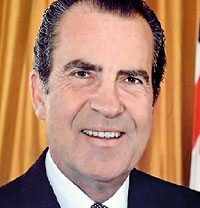Sunday Times 2
A nation resigned to resignations
View(s):I have been musing this month about the question of resignation. It is a sad fact that when ordinary people like you and I do something wrong, we are likely to be accused, arrested, charged and if found to be guilty, punished for our misdemeanours with fines, incarceration or worse. On the other hand, politicians in so called democratic countries do not have to face the prospect of courts and jail terms – all they do is resign.
Take the case of Richard Nixon.

Former US President Richard Nixon
First elected President of the US in 1968, Nixon served a full four year term and was then re-elected in one of the largest electoral landslides in American history. Unfortunately, during his bid for re-election during 1972, members of his administration involved themselves in a series of clandestine and illegal activities – including breaking into the party headquarters of the opposition Democratic Party – that came to be known as the Watergate scandal.
No less than 48 of Nixon’s officials ended up being convicted over the Watergate crimes but Nixon professed that these were all done without his knowledge. However, subsequently discovered tape recordings showed that Nixon did know of the Watergate burglaries – and had actually approved plans to thwart the investigation!
Nixon vehemently professed his innocence and even cited “lapses of memory” (that familiar mata mathaka nae story) – but by the end of July 1974, he had to accept that he would not get away with continued insistence on his innocence (despite his famous line “I am not a crook”). On August 9, 1974 Nixon resigned from the office of President of the United States in order to avoid impeachment and conviction.
As the old saying goes, there is honour among thieves (and politicians are well known to protect their own) – so a month later Gerald Ford, Nixon’s successor as President, granted him a “full, free and absolute pardon” which ended any possibility of Nixon being indicted.
 Nixon’s resignation occurred over forty years ago – but my mind was drawn back to those events because I have been around to witness over the years resignations taking place in our own parliament. I remember the resignation of UNP MP Anura Daniel – who in 1982 resigned after customs officials found on his return from Singapore undeclared watches and gold bars valued at over $100,000 in his baggage. I remember the resignation that same year of the UNP’s Agriculture Minister E.L. Senanayake following allegations of corruption over the awarding of contracts in that ministry.
Nixon’s resignation occurred over forty years ago – but my mind was drawn back to those events because I have been around to witness over the years resignations taking place in our own parliament. I remember the resignation of UNP MP Anura Daniel – who in 1982 resigned after customs officials found on his return from Singapore undeclared watches and gold bars valued at over $100,000 in his baggage. I remember the resignation that same year of the UNP’s Agriculture Minister E.L. Senanayake following allegations of corruption over the awarding of contracts in that ministry.
The problem for political leaders all over the world is that they require the support of other popular politicians to remain in power – and not all politicians who are popular with the voters are blameless in their activities. Many are the politicians who leave parliament at the end of their term richer than when they entered parliament. Some enrich themselves by granting favours and jobs to people, others by allowing themselves to be paid commissions and santhosams for approving contracts and tenders – while yet others allow themselves to receive emoluments for casting their vote for or against a Throne Speech or a motion of impeachment,
It is not easy to catch a crooked politician – and even more difficult to prosecute them and obtain a conviction. Just look at the inordinate delay that has occurred since the Yahapalanaya folk promised to bring to book the wrongdoers in the previous government – with not a single conviction of any criminal big fish having taken place up to now!
How a leader deals with one of his ministers or MPs who transgresses the boundaries of propriety depends on the strength and the moral rectitude of the leader. In the past, ministers whose activities were beginning to attract scrutiny by the media, the public and the opposition could be “shuffled” – say from lucrative ministries like Agriculture, Industries, Transport and Finance to less financially attractive Ministries like Health, Foreign Affairs or Religious Affairs – or even elevated to the post of Speaker. As a last resort, if the situation becomes absolutely intolerable, the leader can gently persuade the errant functionary to resign.
But ordinary citizens like us know that while the resignation of a minister is publicised as the act of a noble person doing the honourable thing, the fact remains that the reason for resignation is that the minister erred and got caught – and that resignation was a face-saving outlet to prevent dismissal or even arrest.
And I may be cynical, but all that these resigned politicians have to do is to lie low for a while, allow the attention of the public and media to be taken up by some new scandal – and they can then be quietly brought back after the hoo-ha they created has been allowed to die down.
Perhaps at some future date they can even be brought back into the cabinet to replace one of their former colleagues who has resigned “honourably”.
In the light of recent events, why do I think that if the Minister of Justice had managed to postpone his departure for a few months – long enough for folk to forget the Perpetual Penthouse story – his place could have been given to the forgiven former Minister of Lotteries!

